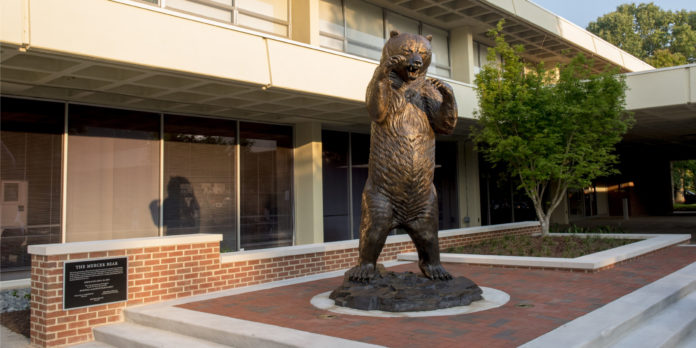ATLANTA – The Association of American Colleges and Universities (AAC&U) recently announced that Mercer University is one of 24 institutions from around the country – and the only in Georgia – to receive a mini-grant to advance civic learning and social responsibility as expected dimensions within student majors.
Supported by funding from The Endeavor Foundation, the Civic Prompts: Civic Learning in the Major by Design initiative aims to limit civic-free zones within departments.
“I am proud that Mercer University and Penfield College’s informatics major have been selected to partner with such prestigious organizations as the Association of American Colleges and Universities and the Endeavor Foundation to focus on liberal education and the development of civic responsibility as critical to ensuring the best possible education for students to carry into their postgraduate lives and careers,” said Dr. Priscilla Danheiser, dean of Penfield College.
Mercer’s mini-grant will be housed within Penfield College’s Department of Mathematics, Science and Informatics. Dr. Feng Liu, associate professor of informatics, and Dr. Colleen Stapleton, professor of science, co-authored the grant application.
Building on a previous AAC&U grant to support activities to develop evidence-based reasoning, scientific thinking and integrative reasoning skills in informatics and liberal studies capstone courses, this latest grant supports a series of faculty and student-faculty workshops designed to assist in formalizing and making more intentional the incorporation of civic responsibility in informatics program learning outcomes. The overarching goal is to make the informatics curriculum a landscape for civic learning.
The grant activities also build on the context provided by Penfield College’s general education curriculum, which seeks to prepare students to live richer and fuller lives of citizenship in a world where different cultures, institutions and technologies intersect in multiple and diverse ways.
“In the informatics major in our department, students interested in information technology have the opportunity to learn through service-learning and hands-on projects that are civic-facing and address issues in social justice. We believe that informatics better equips graduates for participation and influence in a society in which ethical data mining, analysis, presentation of information and evidence-based decision-making – no matter the subject – have become essential for positive civic advancement and change that improves the human condition,” said Dr. Stapleton. “This grant from the AAC&U supported by the Endeavor Foundation allows us to incorporate outcomes that students can take into their postgraduate lives to lead as civic-minded professionals in their communities and workplaces.”
AAC&U received 134 applications aimed at rethinking departmental disciplinary designs for learning, life, work and citizenship. Recipients represent 13 U.S. states and Puerto Rico, and include The Ohio State University, the University of Central Florida, the University of Maryland, College Park, and the University of North Carolina at Chapel Hill.
“Educating for democracy is more critical than ever, and AAC&U is proud to support the departments and institutions receiving grants for their commitment to advancing liberal education in the major as a foundation for fostering civic engagement,” said AAC&U President Lynn Pasquerella.
AAC&U has advocated that the health of American democracy depends on higher education doing its full part in preparing students to be thoughtful, open-minded, informed and responsible citizens and workers in their home communities, nation and the world.
“This group of departments is proof that educating for disciplinary knowledge and educating for democracy are not oppositional but mutually illuminating,” said Caryn McTighe Musil, senior scholar and director of civic learning and democracy initiatives, who directs the Civic Prompts initiative at AAC&U.
A 2012 report by the National Task Force on Civic Learning and Democratic Engagement, titled “A Crucible Moment: Civic Learning and Democracy’s Future,” found that most civic-oriented study occurs in the first two years of students’ academic careers and then shrinks demonstrably as they pursue more concentrated academic study. It therefore calls on colleges and universities to “define within departments, programs and disciplines the public purposes of their respective fields, the civic inquiries most urgent to explore and the best way to infuse civic learning outcomes progressively across the major.”
AAC&U has developed resources to assist departments in integrating civic learning and social responsibility within majors. Among these resources is a 2015 publication by Musil, titled Civic Prompts: Making Civic Learning Routine across the Disciplines, which offers a process for faculty members and their colleagues to explore, on their own disciplinary terms, how to make civic learning customary. The “Civic Learning in the Major by Design” issue of Peer Review, AAC&U’s quarterly journal, also includes nine civic-rich departmental designs, and online case studies include 12 more examples. An AAC&U webinar on “Redesigning Majors” offers additional resources.
For more information on the Civic Prompts: Civic Learning in the Major by Design initiative, visit www.aacu.org/civic-prompts.
About AAC&U
AAC&U is the leading national association dedicated to advancing the vitality and public standing of liberal education by making quality and equity the foundations for excellence in undergraduate education in service to democracy. Its members are committed to extending the advantages of a liberal education to all students, regardless of academic specialization or intended career. Founded in 1915, AAC&U now comprises 1,400 member institutions—including accredited public and private colleges, community colleges, research universities, and comprehensive universities of every type and size. For more information, visit www.aacu.org.
About Penfield College
Mercer University’s Penfield College, established as the College of Continuing and Professional Studies in 2003, is committed to serving post-traditional learners. Undergraduate, graduate and certificate programs are offered to adult learners seeking professional advancement into leadership roles in and beyond their communities. Penfield’s programs provide students with distinctive, multidisciplinary experiences that integrate theory and practice. In addition to providing general education and elective courses for various colleges and schools at Mercer, Penfield offers degree programs in areas including technology, public safety, public and human services, leadership and administration, healthcare and liberal arts. Programs are offered on Mercer’s campuses in Atlanta and Macon, as well as Regional Academic Centers in Douglas County and Henry County, and online. To learn more, visit penfield.mercer.edu.










